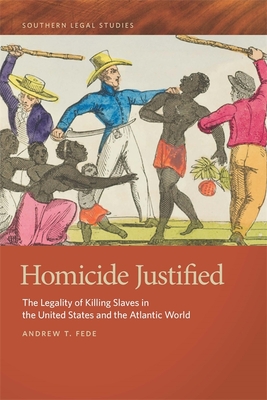

 University of Georgia Press
University of Georgia Press
Homicide Justified: The Legality of Killing Slaves in the United States and the Atlantic World


Key Metrics
- Andrew T Fede
- University of Georgia Press
- Hardcover
- 9780820351124
- 9 X 6 X 0.94 inches
- 1.54 pounds
- Law > Legal History
- English
 Secure Transaction
Secure TransactionBook Description
This comparative study looks at the laws concerning the murder of slaves by their masters and at how these laws were implemented. Andrew T. Fede cites a wide range of cases--across time, place, and circumstance--to illuminate legal, judicial, and other complexities surrounding this regrettably common occurrence. These laws had evolved to limit in different ways the masters' rights to severely punish and even kill their slaves while protecting valuable enslaved people, understood as property, from wanton destruction by hirers, overseers, and poor whites who did not own slaves.
To explore the conflicts of masters' rights with state and colonial laws, Fede shows how slave homicide law evolved and was enforced not only in the United States but also in ancient Roman, Visigoth, Spanish, Portuguese, French, and British jurisdictions. His comparative approach reveals how legal reforms regarding slave homicide in antebellum times, like past reforms dictated by emperors and kings, were the products of changing perceptions of the interests of the public; of the individual slave owners; and of the slave owners' families, heirs, and creditors.
Although some slave murders came to be regarded as capital offenses, the laws con-sistently reinforced the second-class status of slaves. This influence, Fede concludes, flowed over into the application of law to free African Americans and would even make itself felt in the legal attitudes that underlay the Jim Crow era.
Author Bio
Andrew T. Fede has more than 30 years of legal experience practicing in Hackensack, New Jersey. His practice areas including appellate litigation, commercial and governmental civil litigation, municipal law, zoning and planning, real estate tax appeal, labor and employment, employment and other forms of discrimination, wrongful termination, probate law, real estate law, and constitutional law.
He has served as the attorney for the Boroughs of Bogota, Maywood, and Norwood, and for the Township of Mahwah. He has been the planning board attorney, zoning board attorney, library board attorney, and special counsel in six other New Jersey municipalities.
Mr. Fede is a certified mediator in the New Jersey Superior Court mediation program for civil, general equity, and probate cases, is an arbitrator in the Bergen County Superior Court contract/commercial arbitration program, and has been appointed by several Superior Court judges to serve in cases as mediator, arbitrator, special master, and condemnation commissioner.
Since 1986 he has been an adjunct professor at Montclair State University, Upper Montclair, New Jersey. Most recently he has been teaching a legal writing course in the University’s Department of Political Science and Law. He is the author of numerous articles on legal topics, which have appeared in the New Jersey Law Journal, the New Jersey Lawyer newspaper, the New Jersey Lawyer Magazine, the Labor & Employment Law Quarterly, the Municipal Law Review, the New Jersey Municipalities Magazine, and The Record newspaper.
A legal historian, he is the author of Homicide Justified: The Legality of Killing Slaves in the United States and the Atlantic World (forthcoming, July 2017, University of Georgia Press); Roadblocks to Freedom: Slavery & Manumission in the United States South (2011), and People Without Rights: An Interpretation of the Fundamentals of the Law of Slavery in the U.S. South (1992), which was republished in 2011, as well as five scholarly articles that appeared in the Cardozo Law Review, the American Journal of Legal History, the Law and History Review, and FCH Annals: Journal of the Florida Conference of Historians.
He also authored biographies of New Jersey judge Andrew Kirkpatrick and New Jersey judge and influential corporate lawyer James B. Dill in the American National Biography (1999) and of Dill in the Yale Biographical Dictionary of American Law (2009), an article on “Slave Codes” in the Macmillan Encyclopedia of World Slavery (1998), three book reviews that were published in the American Journal of Legal History, and one book review published in the American Historical Review.
Source: Archer Law
Videos
No Videos
Community reviews
Write a ReviewNo Community reviews